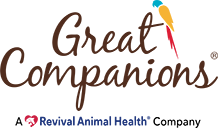
Pet Bird Nutrition
Were you ever told to eat all of your vegetables? Most people have certain foods that they don't enjoy as much as others, and birds are the same way! They will pick out the seeds and other food items that they prefer and then leave the rest. Although this may not seem life-threatening, many avian veterinarians believe that poor nutrition is the most prevalent health problem they see in pet birds. Poor nutrition in a bird can result in a lowered resistance to disease and a host of other health issues.
Proper nutrition is crucial for the overall health of your bird. It is important that you make sure your bird is receiving a balanced diet. It's also important to make sure it is the right diet for your bird, as diet needs can differ from bird to bird. For example, seeds which are high in fat should only make up 10% of a Parrot and Parakeet's diet while Budgies and Cockatiels, who are naturally seed eaters, can tolerate seeds making up 25% of their diets.
Although exact nutritional requirements are not known for every species, research has been helpful in establishing nutritional guidelines. Avian nutrition is a lengthy progress because of how long it takes to determine the effects of certain foods on a bird's long-term health.
Balance and Variety
It's important to realize that a seed-only avian diet does not provide adequate nutrition for a bird. Seeds have to be complemented with various fresh foods and even vitamin and mineral supplements.The best way to make sure your bird is getting the nutrition it needs is to choose an extruded food for 50-60% of their base diet. Extruded foods were made specifically to help solve the malnutrition issue. This food is made from grains, seeds, vegetables and fruits and is fortified with vitamins and minerals. Then it is baked into pellets or a variety of other extruded shapes. It gives your bird a well-balanced diet and prevents them from only eating their favorite foods. Formulated, pelleted bird diets go a long way toward providing complete nutrition, so it usually isn't necessary to add vitamin supplements.
Like everything else in life, variety is important. Fruits and vegetables will be a welcomed addition to your bird's diet; just remember that fresh foods spoil and should be removed from your bird's cage after a couple of hours. Choose fruits and vegetables that are deep in color as they will be more nutritious. Try hanging carrots or sweet potatoes from clips in his cage and choose fruits that would have been available in his native habitat, like mangos, papaya or kiwi. You can also add a variety of grains like cooked brown rice, quinoa and pasta, as well as cooked legumes.
Ensuring that your bird is receiving proper nutrition is crucial for his overall health. Variety is the key to ensuring that you and your bird receive the nutrients that you both need!
Discover More!
Tips for Feeding Your BirdBird Feather Health and Anatomy
Important Vitamins and Minerals for Pet Birds
Return to Bird Articles


